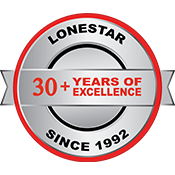Lonestar performs a wide range of Corrosion and Stress Corrosion Tests in accordance with ASTM, NACE or client supplied specifications. A wide variety of routine tests are conducted at Lonestar to determine Intergranular Corrosion Attack, Weight Loss Corrosion, Pitting Corrosion, Crevice Corrosion and Sour Gas Service (SGS) corrosion tests for Sulfide Stress Cracking (SSC), CSC and Hydrogen-Induced Cracking (HIC). These tests amplify types of corrosion typically found in oil and gas, power, construction, shipping, petrochemical and process industries.
Test Conducted by Lonestar on metal specimens
Intergranular Corrosion Test (IGC) as per ASTM A262 Practice A, B, C, E & F. Intergranular corrosion in stainless steels may result from precipitation of carbides, nitrides or intermetallic phases. Only in the most highly oxidizing solutions can intergranular attack be caused by intermetallic phases. When a test is to be restricted to carbides, in a material containing nitrides or intermetallic phases, a less oxidizing solution is chosen.
Hydrogen-Induced Cracking Test (HIC) as per NACE TM0284
Lonestar performs HIC test to evaluate the resistance of pipeline and pressure vessel plate steels to Hydrogen Inducted Cracking caused by hydrogen sourced from aqueous sulfide solutions. The dimensions of hydrogen induced cracks, if any, are recorded and used to compute the values in percentage for Crack Length Ratio (CLR), Crack Thickness Ratio (CTR) and Crack Sensitivity Ratio (CSR), if applicable to the method, or required by the client.
Pitting & Crevice Corrosion Tests as per ASTM G48 Method A, B, C, D, E & F
Lonestar can implement procedures from specific methods for the testing of pitting and crevice corrosion. The corrosion resistance of stainless steel and related alloys in ferric chloride solution is reported for mass loss/unit area, pit depth, depth of crevice, number of attacked sites and CPT/CCT.
Sulfide Stress Corrosion Cracking Test (SSCC) as per NACE TM0177
Sulfide Stress Corrosion Cracking (SSCC) is a form of hydrogen embrittlement cracking which occurs when a susceptible material is exposed to a corrosive environment containing water and H2S at a critical level of applied or residual tensile stress. Lonestar conducts the NACE TM0177 tests including Methods A and B for SSCC test, at our permanent corrosion testing laboratories for 96 hours or 720 hours.
Additional corrosion tests performed at Lonestar include the following
| Chloride Stress Corrosion Test as per ASTM G36 Specification |
| Corrosion test as per ASTM G35 specification |
| Corrosion test as per ASTM A761 Specification |
| Client Specific Corrosion Testing Methods |
| Susceptibility to Intergranular Corrosion |
| Examination of Scales and Corrosion Products |








